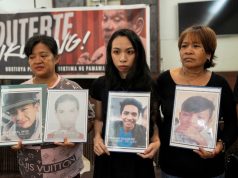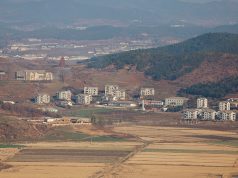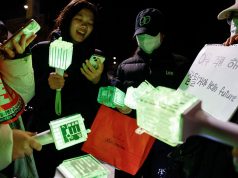
Actress Agot Isidro shared a report of the Quezon City Police Department arresting 302 individuals in one night and likened it to that of the Martial Law period.
However, some people were quick to comment that the arrests were for violating Quezon City’s ordinances.
Isidro is known as a vocal critic of the Duterte administration, receiving hateful comments and violent threats on social media from the president’s supporters.
Martial Law na ba? ?
Hindi ako na-brief. https://t.co/PI0ktxedpL
— Agot Isidro (@agot_isidro) June 17, 2018

People commented that the actress should’ve read the report first.
Read before you react.
— 2 Less Lonely People (@MessageInASong) June 17, 2018
Others responded that the city ordinances were already in effect before, justifying the arrests done on the violators.
Hindi pa po martial law ateng, pero nasa law po yan, hi hi hi hi
— Josh (@josh40s) June 17, 2018
The QCPD on Saturday said it has apprehended some 302 violators of laws & city ordinances due to its intensified anti-criminality operations.
HINDI YAN MARTIAL LAW, CITY ORDINANCE PO.
KARAPATAN/MANDATO YAN NG BAWAT CITY/MUNICIPALITY.
ASK MO SI HERBERT KUNG ML YAN? #GutomAgot
— SilentROAR (@RoaringFigther) June 17, 2018
A look at the ordinances violated
The report noted that 302 “tambays” were arrested by QCPD last week supposedly in response to President Rodrigo Duterte’s pronouncement to make the streets safer.
QCPD Chief Superintendent Joselito Esquivel said in Filipino, “We intensified the implementation of city ordinances according to the instruction of our president to make our streets safe and peaceful.”
There were also individuals arrested for possessing illegal drugs and paraphernalia, violating RA 9165 or the “Comprehensive Dangerous Drugs Act of 2002.”
In Quezon City, however, police used ordinances that have long been in place in making the arrests.
Quezon City Ordinance No. 1515: The Anti-Smoking Ordinance
QC Ordinance No. 1515 was adopted on Mar. 8, 2005 by then-Mayor Feliciano “Sonny” Belmonte, Jr.
The ordinance bans people from smoking in public places, including schools, elevators, stairwells, gas stations, hospitals, airports, bus stations, ship and train terminals, restaurants, conference halls and areas for food preparation, among others.
It also outlines standards for a designated smoking area and specific signages, including its typeface.
For a first-time violator, a fine of P500 to P1,000 may be collected.
Quezon City Ordinance No. 2301: Quezon City Discipline Hours for Minors
QC Ordinance No. 2301 was enacted on June 23, 2014 by Mayor Herbert Bautista.
The ordinance prohibits people below 18-years-old to loiter in public places without adult supervision from 10 p.m. to 5 a.m. and without “lawful purpose or justifiable reason.”
Those exempted from the ordinance are minors in emergency situations, those on their way or from graduation ceremonies, masses and other school-related extracurricular activities, among others.
For first-time offenders, they will be brought to the nearest barangay hall or police station, where they would be counseled by the Barangay Council for the Protection of Children.
The parent or legal guardian of the minor will be penalized with P2,000 or render community service for 48 hours.
Quezon City Ordinance No. 2612: The Illegal Barker Ordinance
QC Ordinance No. 2612 was enacted on July 17, 2017 by Mayor Herbert Bautista.
The ordinance prohibits anyone from performing the duties of a barker in places not officially designated as transport terminals.
It defines barker as any person who calls passengers to ride a public vehicle such as jeepneys, buses, taxis or tricycles.
First-time offenders will be fined with P1,000 or be required to render community service for five days.
Quezon City Ordinance No. 2623: The Anti-Exhibitionist Ordinance
QC Ordinance No. 2623 was approved on Oct. 18, 2017 by Quezon Mayor Herbert Bautista.
The ordinance prohibits people from walking around naked in public places.
“Naked person” is defined as an individual who appears “to be without any clothing, whether only the uppermost or lowermost portion of the body or completely wearing nothing.”
Those who are suffering from mental disorders are not exempted from the ordinance. They will be apprehended but penalties shall not be enforced.
Violators who committed the offense on the first time will be fined with P1,000 or be required to do community service for three days.
Quezon City Ordinance No. 5038: The Anti-Drinking Ordinance
QC Ordinance No. 5038 was approved on April 2, 1962 by then-Vice Mayor Vicente Novales.
The ordinance bans people from drinking alcoholic beverages on public sidewalks, streets, avenues, thoroughfares, parks or plazas at “any time of the day or night.”
Exemptions are made to public parks designated for picnic areas and “excursions for health resorts.”
Violators of the ordinance are fined from P25 to P100. They can also be jailed from 10 to 30 days.
—
Without specific ordinances by which police could apprehend individuals, a general crackdown on simple vagrancy is “patently illegal,” human rights organization Karapatan suggested.
Congress, however, declared that vagrancy was no longer a criminal act years ago.
We already amended the Revised Penal Code and decriminalized vagrancyby virtue of RA 10158 over 6 years ago for being discriminatory and anti-poor. I wonder what is the basis of the PNP in arresting “tambays” and what they are charging them with…
— Chiz Escudero (@SayChiz) June 19, 2018
Karapatan said that arresting individuals for wandering outside their homes violates rights against illegal arrests, illegal search and seizure, and impede their rights to mobility.









